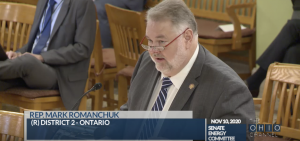News
Legislature Looking At Different Routes For Potential HB6 Repeal
By: Andy Chow | Statehouse News Bureau
Posted on:
COLUMBUS, Ohio (Statehouse News Bureau) — An Ohio Senate committee held a hearing on two different pieces of legislation that address the sweeping energy law, HB6, which creates more than $1 billion in subsidies for nuclear and coal plants. Legislators now have three options in front of them to deal with the bill connected to a $61 million corruption case; keep the law in place, repeal it, or partially repeal the law.

Rep. Mark Romanchuk (R-Ontario) is offering another option, HB772, a partial repeal of HB6 which would eliminate the ratepayer subsidies bound for nuclear, coal, and solar plants ($20M/year) but retain the cuts HB6 makes to renewable energy standards and the elimination of the energy efficiency standards.
“It is irresponsible and unnecessary for this body or the PUCO to be engaged in any policy that affects the generation market,” Romanchuk told the Senate Energy and Public Utilities Committee on Tuesday.
But supporters of a full repeal say the entire process to pass HB6 is tainted by a $61 million bribery, which some defendants have plead guilty to.
Federal prosecutors say a utility, believed to be FirstEnergy, funneled millions of dollars to a dark money organization that helped lobby and campaign for HB6. The bill, which was signed into law July 2019, accomplishes several items on FirstEnergy’s legislative agenda for the past decade, including rolling back the clean energy standards.
Miranda Leppla, vice president of energy policy for the Ohio Environmental Council Action Fund, says Romanchuk’s bill does not go far enough.
“It overlooks the least costly resource out there, energy efficiency. If the Ohio General Assembly desires to reduce harmful emissions and lower energy bills, state policy must invest in energy efficiency and also signal that Ohio is open for clean energy business. Given our existing barriers and lack of incentives for efficiency, companies will choose to invest resources and money in other states that are more welcoming to clean energy innovation,” Leppla said in a written statement.
The legislature has until the end of the year to make a decision on HB6 before new charges begin to appear on electric bills that collect the revenue for the power plant subsidies. Supporters of HB6 say the elimination of the clean energy standards offset the new subsidies, a claim that is disputed by opponents.

